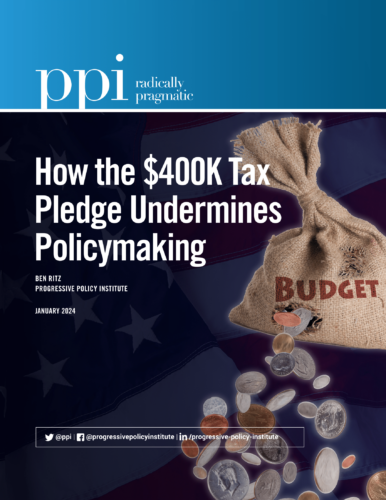Although we at the Progressive Policy Institute (PPI) believe some modest relief from overly burdensome debt is warranted, we are concerned many of this rule’s provisions would provide generous windfalls to relatively affluent borrowers while providing little additional benefit for borrowers most in need. The rule also comes with a high cost to taxpayers — $147 billion by the department’s own estimates — yet has no offsets to pay for it, making it a clear violation of the Fiscal Responsibility Act’s administrative PAYGO provision. Proceeding with this rule as written would only worsen the existing bias that federal policy has towards the minority of young people who attend college, at the expense of the majority who do not yet will be saddled with the bill.
Founded in 1989, PPI – a 501(c)(3) think tank – is a force for radically pragmatic innovation in politics and government. Our mission is to develop a new progressive blueprint for change that can help center-left parties broaden their appeal and build stable governing majorities. PPI has been a prominent voice in fiscal policy through our Center for Funding America’s Future, which works to promote a fiscally responsible public investment agenda that fosters robust and inclusive economic growth. The Center has played a critical role in shaping fiscal policy debates around key legislation over the past five years and has been extremely involved in the national college affordability discussion.
In a previous comment, we applauded the administration’s efforts to expand and improve upon income-driven repayment programs, which we believe are the best mechanisms to help borrowers who are burdened by the debt of pursuing degrees from which they did not ultimately benefit. But we also warned that the Department’s SAVE plan was overly aggressive in scope, leading to the typical college graduate paying back only three fifths of what they initially borrowed — and not a dollar of interest. Providing such a generous subsidy is profoundly unfair to the majority of American taxpayers who didn’t attend college and are being asked to foot the bill for people who did, despite earning lower average incomes than them. Even worse, it is likely to further inflate the already high costs of college by incentivizing universities to hike tuition rather than control costs.
PPI is concerned that the current proposed rule would compound these mistakes. The rule’s most expensive provision, the cancellation of accumulated interest, will mostly benefit wealthy professionals while being redundant for low-income borrowers struggling with high debt burdens. Enrolling the SAVE plan already prevents borrowers with large loan balances and lifetime earnings equal to or below those of the average college graduate from having to pay any interest. But borrowers who enhance their future earnings by taking on large debts, such as lawyers, doctors, and other professional degree holders, will reap a significant windfall that they should not get if this rule is finalized as proposed. Currently, the rule proposes to cancel up to $20,000 of interest for those on standard repayment and an unlimited amount for those enrolled in IDR. We urge the department to set this interest cap as low as possible for all borrowers to limit these regressive impacts.
We are similarly concerned about the provision to forgive all loans after 20-25 years. Those enrolled in IDR plans even before the SAVE plan was enacted were on track to have their balances forgiven after 20-25 years of making the required payments. If someone is paying back student loans for more than 25 years, they are likely a professional degree holder with a large debt balance who has chosen to structure their repayment plans over a longer period of time. Giving forgiveness to a relatively affluent group in the last few years of their repayment is unnecessary and arbitrary, especially when the most vulnerable borrowers already benefit from a similar policy.
We are more sympathetic towards the provision providing relief to borrowers who attended low-value educational institutions. These students are most likely to be burdened by the debt of pursuing a degree from which they did not financially benefit. We applaud previous rulemaking from the department targeting these often fraudulent institutions, forcing them to transparently disclose the financial value they provide for students, cutting off future federal aid, and closing them if necessary. But we encourage the Department to work with Congress to ensure the costs of canceling this debt are borne by these predatory institutions as much as possible rather than asking taxpayers to foot the bill.
The administration has already spent more than $600 billion of American taxpayer money on executive actions to cancel student loan debt, most of which belonged to individuals with above-average lifetime earnings, without explicit approval from Congress. We urge the Department to work with lawmakers on developing progressive reforms to the SAVE plan, greater accountability for educational institutions, and other common-sense reforms to control the cost of higher education rather than pursuing more unilateral debt cancellation schemes.
Even in the absence of congressional action, we also encourage the Department to keep the above concerns in mind when developing their proposed regulations on “waivers for hardship,” as is mentioned to be forthcoming in the proposed rule.




